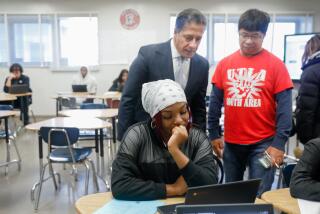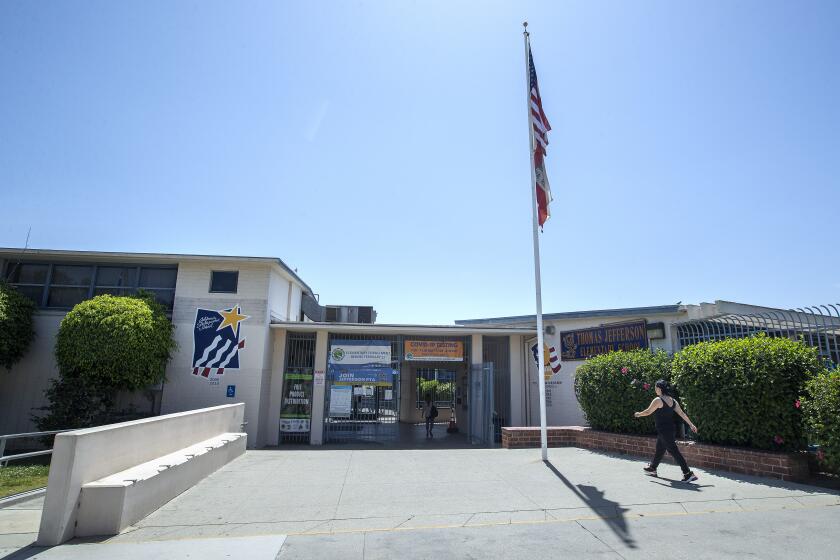Funding for L.A. Unified’s iPad program uncertain after three years
A $1-billion plan to put an iPad into the hands of every Los Angeles student and teacher could prove difficult to financially sustain after about three years, based on figures provided by the L.A. Unified School District.
The district’s description of funding options emerged during a Board of Education meeting Tuesday at district headquarters.
Los Angeles schools Supt. John Deasy has called the technology upgrade an essential academic initiative. He has also noted that new state tests are supposed to be taken on a computer.
But the rollout, at 41 schools so far, has encountered problems, including more than 300 students deleting security filters so they could visit any website. In response, the district suspended use of the iPads off campus.
The iPad project is to be funded with one-time, school construction bonds paid back over about 25 years. The devices have a guaranteed life of three years.
For the first time, officials addressed how they will continue paying for the program after three years.
Chief Strategy Officer Matt Hill offered four scenarios, each with potential problems.
The first is to use funds left over from construction projects to pay for more devices. But L.A. Unified already doesn’t have enough bond money to fix up and maintain its schools. Hill said bonds will cover only about 25% of maintenance and repair over the next few years.
The second and third options require voters to pass new local or statewide bonds to pay for the program.
“A technology bond is really good thinking,” said Scott Folsom, a member of the district’s bond oversight committee. “But you continually hear from parents, voters and taxpayers that they’re so upset over the iPads that they’re never going to vote for another bond again.”
Hill’s last option is to set aside $100 per child each year from the general fund, starting in the 2016-17 school year, to gather as much as $252 million needed by fall 2018.
Hill estimates that future tablets will drop in price, costing $200 to $400 apiece. Currently, iPads cost L.A. Unified $768 apiece.
That higher than retail price includes a limited three-year warranty, a protective case and other features. The bundle of extras is worth at least $200 more than the district paid for each device, Hill said.
Hill’s team also attempted a reckoning of other ongoing costs, such as higher electricity bills, a larger technical staff, computer network maintenance, security costs and software licenses. Those expenses will soon surpass $50 million annually.
Another looming cost is for curriculum. The district’s iPads now include math and English course materials. The licenses expire in three years and updating the material will require more money.
The district is also planning to buy other digital curriculum, such as French or science.
Hill said such costs would be covered through funding for textbooks, which averages about $63 million a year.
Senior administrators said the iPad project is the right thing to do.
“We know that we can do this,” said iPad project leader Bernadette Lucas. “No one can argue with the facts.”
Testimonials included that of 10-year-old Jayla Hill, who talked of doing research online and shooting down math zombies by finding the right equations “before the monster comes toward you.”
“Most of the kids in my class have trouble in math,” said the South L.A. fifth-grader. The iPad “makes it better and easier” to focus on problem areas.
Her principal, Arlene V. Fortier of 54th Street Elementary, said her teachers and students have benefited from using the iPads, despite complaints from some critics that the effort is overly expensive and poorly executed.
“I am disappointed in all the negativity surrounding this project,” she said.
Deasy would like the board to approve of the entire project in December.
Board member Monica Ratliff, however, introduced a measure to delay a decision until the end of the school year and suspend distribution of more iPads. The board will vote on her proposal next week.
More to Read
Start your day right
Sign up for Essential California for news, features and recommendations from the L.A. Times and beyond in your inbox six days a week.
You may occasionally receive promotional content from the Los Angeles Times.







